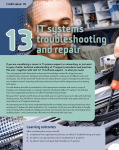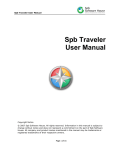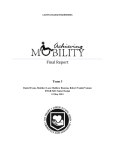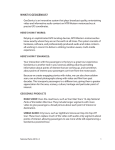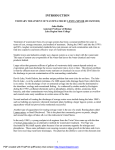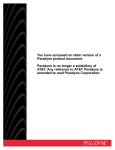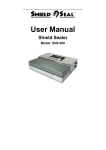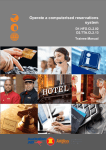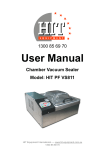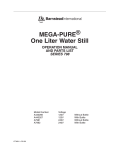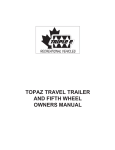Download Planning & Preparation What time of the year should I travel?
Transcript
The Di sa bl ed T r av el er ™ • top 2 0 “ Most as k e d ” acc e ss i b l e t r av e l q u e st i o n s Table of Contents: Disclaimers.............................................................................................................................................3 Welcome & Introduction......................................................................................................................4 Planning & Preparation: If I’m a first-time traveler, where do you recommend I go?..............................................................6 What time of the year should I travel?.................................................................................................7 What should I bring with me during my travels?..............................................................................8 I need to fly with medical equipment. Does that count against my luggage flying quota?...........9 Should I use an accessible travel agent?.............................................................................................10 Internet & Technology: Where are some good ways to research accessible trips/vacations?................................................13 What are some of the best accessible travel apps for my smartphone?..........................................14 What websites are the best to book my flights & hotels?.................................................................16 Flying & Transportation: Is it better to fly direct or have layovers?............................................................................................19 What types of batteries for power wheelchairs/scooters do airlines accept?.................................20 Do I have to wait in the long security line at the airport?...............................................................21 Can I bring my wheelchair on board an airplane with me?............................................................22 How do I get on an airplane if I’m in a wheelchair?........................................................................23 How do I go to the bathroom during a long flight?.........................................................................25 I need a wheelchair accessible van/vehicle for my travels, where should I rent one?...................28 What if something goes wrong or my rights were violated during my flight?..............................29 Accommodations & Lodging: What questions should I be asking when making room reservations?..........................................31 What if I get to my room and it is not as advertised?......................................................................33 Health & Lifestyle: How do I stay healthy as possible during my travels?......................................................................35 Are there any reasons why I should NOT travel with a disability?.................................................37 fo l low m e : fac ebo o k & tw itter • ©201 2 seen +n oted, llc. All r i ghts r eserved • page 2 The Di sa bl ed T r av el er ™ • top 2 0 “ Most as k e d ” acc e ss i b l e t r av e l q u e st i o n s ! NOTICE: You do NOT have the right to reprint or resell this eBook! *** ALL RIGHTS RESERVED No part of this eBook may be reproduced or transmitted in any form whatsoever, electronic, or mechanical, including photocopying, recording, or by any informational storage or retrieval system without express written, dated and signed permission from the author. DISCLAIMER AND/OR LEGAL NOTICES The information presented herein represents the view of the author as of the date of publication. Because of the rate with which conditions change, the author reserves the right to alter and update his opinion based on the new conditions. The eBook is for informational purposes only. While every attempt has been made to verify the information provided in this eBook, neither the author nor his affiliates/partners assume any responsibility for errors, inaccuracies or omissions. Any slights of people or organizations are unintentional. If advice concerning legal or related matters is needed, the services of a fully qualified professional should be sought. This eBook is not intended for use as a source of health, legal or accounting advice. You should be aware of any laws that govern business transactions or other business practices in your country and state. Any reference to any person or business whether living or dead is purely coincidental. You also MAY NOT give away, sell, or share the content herein. If you obtain this eBook from anywhere other than http://www.the-disabled-traveler.com, you have a pirated copy. Please help stop Internet crime by reporting this to: [email protected] © Copyright The Disabled Traveler which is owned and operated by Seen+Noted, LLC fo l low m e: fac ebo o k & tw itter • ©201 2 seen +n oted, llc. All r i ghts r eserved • page 3 The Di sa bl ed T r av el er ™ • top 2 0 “ Most as k e d ” acc e ss i b l e t r av e l q u e st i o n s I’ve spent nearly 20+ years traveling to various parts of the world — all while living with a progressive neuromuscular disease. So, I personally know firsthand what it’s like to travel with assistive devices such as leg/foot braces, canes, walkers, manual wheelchairs and now with a power wheelchair. Hola! Caio! Bonjour! My name is Justin Skeesuck and I’m The Disabled Traveler. I want to take you on a journey to answer the Top 20 “Most Asked” Accessible Travel Questions I consistently receive from my students who are People with Disabilities. They simply WANT to travel but don’t quite know HOW to go about it! If you don’t know who I am or have never heard of me before, there’s a short bio on my website located at http://the-disabled-traveler. com/about where you can find out how more about me, sign up, and learn how I can help you become a smarter, more efficient traveler than you are right now. It’s my goal to provide you with only the BEST information and answers so you may begin to “see the world differently” as I do. And, with this book, I hope I can help answer those burning questions you might have regarding the world of accessible travel. I want to assure you that traveling with a physical disability is completely ACHIEVABLE. I’m living proof and I have met and helped many others like you to get out there and travel! Our world is a place that NEEDS to be seen, taken in, and experienced by EVERYONE! Even those living with a disability of ANY kind. I hope you enjoy this FREE book and learn from my experiences so you too can travel more efficiently, more effectively and most importantly, with ease! Yours truly, Justin Skeesuck fo l low m e : fac ebo o k & tw itter • ©201 2 seen +n oted, llc. All r i ghts r eserved • page 4 Planning & Preparing The Di sa bl ed T r av el er ™ • top 2 0 “ Most as k e d ” acc e ss i b l e t r av e l q u e st i o n s Planning & Preparation If I’m a first-time traveler, where do you recommend I go? I get asked this question ALL the time. So, it’s only prudent that I lead off with this. If you are a first-time traveler, meaning, that you have NEVER traveled before with a disability, I personally recommend that you start locally. Have a “stay-cation” which is a vacation in your hometown. Gather yourself a small budget and call to book a accessible room at a hotel in another part of your home town. You can drive there in your own vehicle (if you own one) or take public transportation to get there is another option as well. This way, you can get out of your home environment without having to be too removed from it. You can ALWAYS go home if it becomes too hard for you. So, no stress! It’s a perfect safety net for first-timers and will get you used to being outside of your “comfort zone” at home. Another great option for the first-time travelers who are a little bit more adventurous, try a 2-3 day cruise. Cruises are a great way to get accommodated to traveling with a disability because they, for the most part, have gone above and beyond the accessibility requirements and make it really easy for their customers. Everything on the ship is accessible and the rooms are completely accessible as well. They have roll in showers, generally more space than other state rooms, and the best part is that you only have to unpack once! All ships have elevators and are easy to navigate around because they are mostly flat. They also have lots of things to do such as swimming (don’t worry, they have pool lifts which are chairs that you sit in which will drop you down into/out of a pool or spa), gambling, shopping and you can have the opportunity to gorge yourself on the endless buffets! If a cruise is something you are interested in, I would recommend try calling Debra at Easy Access Travel (easyaccesstravel.com). She is an accessible travel agent who has lots of experience in the cruise industry. If you need to rent equipment such as wheelchairs, walkers, etc., check out Special Needs at Sea (specialneedsatsea.com). fo l low m e : fac ebo o k & tw itter • ©201 2 seen +n oted, llc. All r i ghts r eserved • page 6 The Di sa bl ed T r av el er ™ • top 2 0 “ Most as k e d ” acc e ss i b l e t r av e l q u e st i o n s Planning & Preparation What time of the year should I travel? weather (in northern hemispheres) and pretty much no crowds. But, most likely you’ll see a lot of tourist sites/monuments closed. Secondly, it depends on where your destination lies in the hemisphere. It’s not in my DNA to tell you WHEN and WHERE you should travel… but I think there Example: When it is winter in the Northern are a few things you should at least be aware Hemisphere, Australia is basking in the of in regards to traveling with a disability. Southern Hemisphere’s summer, and vice versa. Midwinter in Australia is July and The “Travel Seasons” August, and the hottest months are NovemIn the realm of the travel industry, there are ber through March. Remember, unlike in the what’s called “travel seasons”. northern hemisphere, the farther south you This refers to the times of the year where the go in Australia, the colder it gets*. tourist industry is the heaviest, moderate, and Personally, I love the shoulder season because lightest. It also varies by which part of the it has the mix of both good weather and less hemisphere you want to visit. crowds. And, you get more bang for your First, let’s break down the seasons: buck to boot! High: Late May, June, July and August are typically high season and most expensive to travel. Chances are you will run into lots of other tourists and, depending on where you go, it can be REALLY hot! Shoulder: April, early May, September and October are typically shoulder seasons and are more economical to travel. The weather is milder and you have less crowds however, some tourist sites/monuments might be closed. Low: November, December, January and February are typically the slowest and cheapest to travel. Here, you will run into colder Seasonal Weather Patterns What I mean by this is something that often sneaks up on you or that you just simply don’t think of is: seasonal weather patterns. You may not be fond of pushing your wheelchair through thick snow or visiting the Caribbean during hurricane season! I’d check wunderground.com for your desired destination(s) to see what the yearly weather patterns are like before you book. * Source: NY Times -”When to go” fo l low m e : fac ebo o k & tw itter • ©201 2 seen +n oted, llc. All r i ghts r eserved • page 7 The Di sa bl ed T r av el er ™ • top 2 0 “ Most as k e d ” acc e ss i b l e t r av e l q u e st i o n s Planning & Preparation What should I bring with me during my travels? Resource: Travelin Wheels has a great online article on Traveling with Medications that’s worth a read if you have a moment. Finally, don’t forget such important items as battery chargers (for power chairs & scooters), eyeglasses and hearing aids if you need them. Secondly, I would suggest that you pack light and bring TWICE the money! “In your travels you’ll meet two kinds of tourists: those who pack light and those who wish they had!” — Rick Steves’ This is a loaded question and it completely depends on who you are as an individual. Traveling with a disability (depending on your disability) requires us to carry more than the average individual. Being prepared is one of the best ways to minimize complications during your travels. Packing light (your clothes and personal hygiene items) will help alleviate some of the First off, evaluate what your medical needs are load and make your life easier in the process. on a daily basis because you will need to bring Resource: Wheel Adventure as a quick article these items with you as you travel. on Packing Tips for People with Disabilities. Look at such things as medications and As somebody once told me… “You can always mobility aid devices such as canes, walkers, buy deodorant, T-shirts, toothbrushes, and wheelchairs, scooters, etc. underwear pretty much anywhere in the world!” Then, I would consult with your physician to see what you will need during your time Now, that’s some good advice! away. Explain what you are wanting to do. Your physician should be able to help provide you with the proper medication dosages and make recommendations for consumption/ application. fo l low m e : fac ebo o k & tw itter • ©201 2 seen +n oted, llc. All r i ghts r eserved • page 8 The Di sa bl ed T r av el er ™ • top 2 0 “ Most as k e d ” acc e ss i b l e t r av e l q u e st i o n s Planning & Preparation I need to fly with medical equipment. Does that count against my luggage flying quota? Please note: This only applies to US-based travelers only. If you are located outside the United States, please check with your airline first to see what they have as far as regulations for traveling with medical equipment. Short answer: no! Each airline has different rules and regulations for baggage fees, so it’s important to know EXACTLY what your rights are if you are traveling with a disability. By law, US-based airlines CANNOT charge you for any medical equipment that you will need during your travels. If you need medical equipment such as (but not limited to): wheelchairs/scooters, battery chargers, prosthetic devices, breathing equipment, medications, bathroom commode’s, bath benches & seats, etc., you are allowed to bring them with you and will not be charged for them. As a safeguard, I would check the Transportation Security Administration (TSA) website by visiting www.tsa.gov to learn exactly what the laws and regulations apply to People with Disabilities. fo l low m e : fac ebo o k & tw itter • ©201 2 seen +n oted, llc. All r i ghts r eserved • page 9 The Di sa bl ed T r av el er ™ • top 2 0 “ Most as k e d ” acc e ss i b l e t r av e l q u e st i o n s Planning & Preparation Should I use an accessible travel agent? Travelers with Disabilities often need assistance with all of the moving components that come with traveling. There are a wide variety of needs associated with this such as transportation, accommodations, medical equipment rentals and lots more which can be a little overwhelming especially if you are a first-time traveler. The good news is, you’re in luck! Within the travel industry, there are travel agents and agencies who focus their efforts directly for People with Disabilities. What can they do for you? They can handle many aspects of any type of vacation from airfare to lodging to booking sightseeing tours. — They can customize based on your interests, abilities, and energy level. — They can act as an advocate for you (answer questions about safety/security). — They can save you time. — They can save you $$$! (Best options, prices & value). Types of Accessible Travel Agents/Agencies Generally, there are three different types of accessible travel agents/agencies: Full-service: These are companies that provide a full range of services for Travelers with Disabilities. This includes booking cruises, airfare, hotels, tours and excursions, accessible transportation, accessible rentals, etc. for pretty much anywhere in the world. Please note: some do have limitations with their product offerings. You will have to inquire with each company directly. Destination Specific: Like above, these are companies that provide accessible services for specific destinations and generally do not go outside their spectrum. Disability Specific: Also like full-service, these are companies that work directly with people with specific types of disabilities such as intellectual/cognitive, blind, deaf, physical or a combination of. So, should I use one then? First, you will need to ask yourself… — Do I have the time to research on my own? — Do I have the energy planning all the aspects of my own trip/vacation? If not, then you would greatly benefit from the right accessible travel agent. fo l low m e : fac ebo o k & tw itter • ©201 2 seen +n oted, llc. All r i ghts r eserved • page 1 0 The Di sa bl ed T r av el er ™ • top 2 0 “ Most as k e d ” acc e ss i b l e t r av e l q u e st i o n s Awesome. Where do I find one? My recommendation is to Google “Accessible Travel Agents” and see what comes up for you. There are plenty out there for you to choose from. In the end, I recommend you try to find an accessible travel agent/agency that can answer your pertinent questions and has good overall knowledge of where and what you are trying to achieve. To get you started, here are some more wellknown and reputable accessible travel agents/ agencies that I know of: Interview at least 2-3 before you make a final decision on which company to go with. Able to Travel (abletotravel.org) A full-service accessible travel agency owned and operated by United Spinal. The largest one out there. Easy Access Travel (easyaccesstravel.com) A full-service accessible travel agency owned and operated by Debra Kerper. She is super knowledgeable and really nice! Always trust your gut. If any particular company or organization is promising too much it’s like the old saying says… “If it’s too good to be true, it probably is.” Sage Traveling (sagetraveling.com) The Europe-specific travel agents at Sage Traveling use their expertise in European accessible travel to create custom accessible holidays for disabled and senior travelers. Hammer Travel (hammertravel.org) They provide travel opportunities for people with developmental disabilities that are unique, safe, and enjoyable. Disaboom also has a good article by Candy Harrington on Finding the Right Travel Agent It will provide some really good insight on how to filter out some good ones from some *not so good* ones. fo l low m e: fac ebo o k & tw itter • ©201 2 seen +n oted, llc. All r i ghts r eserved • page 1 1 Internet & Technology The Di sa bl ed T r av el er ™ • top 2 0 “ Most as k e d ” acc e ss i b l e t r av e l q u e st i o n s Internet & Technology I also have a few websites that I check as well. What are some good ways to research accessible trips/ vacations? It wasn’t until I started talking with the owners of some of these websites and meeting them in person that I realized that the information they had was solid. Doing good research is the cornerstone of what makes a great experience from a horrible experience. The good thing about the internet is there’s plenty of information out there for you to peruse through. But the downside is whether or not the information you are reading is reliable. Right? So, where do you start then? I typically approach researching for any upcoming vacation/trip by checking online forums. There are a myriad of disabled-travel-focused online forums that can give you some good insight on other peoples’ perspectives. These are some of my favorites: Lonely Planet Thorn Tree — Travelers with Disabilities Apparelyzed — Travel Tips & Wheelchair Accessible Holiday Destinations Forum TripAdvisor — Traveling with Disabilities Forum FlyerTalk — Disability Travel Forum Wheelchair Traveling Wheelchairtraveling.com exists to give YOU the tools to plan your adventure accordingly. It’s an international resource built by other wheelchair travelers on accessible destinations and activities. Highly recommended! Travelin Wheels Blog An excellent resource for ongoing accessible travel destinations, tips & tricks and more. Finally, there’s nothing like a good travel book, right? So far, there’s not a ton of disabled-focused ones but here are a few: 101 Accessible Vacations: Travel Ideas for Wheelers and Slow Walkers By Candy Harrington 22 Accessible Road Trips: Driving Vacations for Wheelers and Slow Walkers By Candy Harrington There is Room at the Inn: Inns and B&Bs for Wheelers and Slow Walkers By Candy Harrington fo l low m e : fac ebo o k & tw itter • ©201 2 seen +n oted, llc. All r i ghts r eserved • page 1 3 The Di sa bl ed T r av el er ™ • top 2 0 “ Most as k e d ” acc e ss i b l e t r av e l q u e st i o n s Internet & Technology What are some of the best accessible travel apps for my smartphone? Did you know that smartphones in use recently surpassed the 1 billion mark and is expected to double by 2015!* Yes, that is billion with a “B”… More and more Travelers with Disabilities are using smart phones to their advantage. If you haven’t jumped on the bandwagon yet, you should! So, which applications should you be using? Don’t fret. I pulled together my Top 10 recommended travel apps for smartphones: Skype (Free w/optional subscription) My #1. Lets you make phone calls and video chat to anywhere in the world for virtually pennies on the dollar. Evernote (Free w/optional subscription) Lets you use your smart phone to take “virtual notes. Save your ideas, things you like, things you hear, and things you see on-the-fly. My TSA (Free) Gives you 24/7 access to information that passengers frequently request from the Transportation Security Administration (TSA). TripIt (Free) Lets you organize trip details into one master online itinerary — even if arrangements are booked at multiple travel sites. It automatically includes maps, directions, and weather in their master itinerary. You have the option to book restaurants, theatre tickets, activities, and more right from within the online itinerary. And safely access travel plans online, share them, check-in for flights, or print an itinerary. Google Translate (Free) Translate words and phrases between more than 60 languages. For most languages, you can speak your phrases and hear the corresponding translations. Google Maps (Free) Google maps simply rock! Just use it to locate where you are but please note that if you are “roaming” I would suggest using a Wi-Fi hotspot! Otherwise, your charges will be outrageous. fo l low m e : fac ebo o k & tw itter • ©201 2 seen +n oted, llc. All r i ghts r eserved • page 1 4 The Di sa bl ed T r av el er ™ • top 2 0 “ Most as k e d ” acc e ss i b l e t r av e l q u e st i o n s Get Human (Free) Why wait? This is a free app that tells you the swiftest way to reach a live operator (for example: dial the 800 number, then press 1 and then 4). Great if you have your credit card confiscated by an ATM! Rooms ($0.99) Do you always forget what hotel room you’re in? With Rooms, you can store and easily check your hotel room number on your iPhone. You can also add a note to remind yourself which building or tower the room is in, or which elevator to take etc. Rick Steves’ Audio Europe (Free) This app organizes Rick’s vast and varied library of audio content into geographic-specific playlists so you can enjoy ready access to the information that relates specifically to your travel plans. You’ll get Rick’s self-guided tours for dozens of Europe’s top museums, sights and historic walks — plus 200 tracks of travel tips and cultural insights from his radio show — all for FREE! Wikitravel (Free - online mobile site) Wikitravel is a project to create a free, complete, up-to-date, and reliable worldwide travel guide. So far there is approximately 25,732 destination guides and other articles written and edited by Wikitravellers from around the globe. *Bloomberg (http://www.bloomberg.com/news/2012-10-17/smartphonesin-use-surpass-1-billion-will-double-by-2015.html) fo l low m e : fac ebo o k & tw itter • ©201 2 seen +n oted, llc. All r i ghts r eserved • page 1 5 The Di sa bl ed T r av el er ™ • top 2 0 “ Most as k e d ” acc e ss i b l e t r av e l q u e st i o n s Internet & Technology What websites are the best to book my flights & hotels? packages. They were sued a few years ago for not having accessibility offerings so, now they enhanced their website so you can now search for wheelchair accessible rooms. Obviously, there’s a plethora of websites to choose from and you have complete freedom to feel out which ones you are most comfortable with. But, I do have few recommendations to at least get you pointed in the right direction. Below are some of the major websites: Kayak.com Their motto: “Search one, then done.” And, that’s exactly how it works. You put in your search criteria and it searches all of the major (and some minor ones) travel-based websites at once. It’s a great way to see from a birds eye view, all of the offers that are out there. Highly recommended. Expedia.com One of the largest, if not THE largest in the online travel game. I personally have used this website multiple times without a hitch. If you do have accessible requirements when traveling, there is a accessible input area during the checkout phase. Hotels.com As the name states, they are more hotel-focused but they do offer flights and vacation Sometimes, it’s better to look at some of the “lesser-known” websites. They can be highly competitive because they have to compete with the larger ones. Below are some “lesser-known” websites: Go-Today Go-today is an online travel provider offering vacation packages and customized itineraries to destinations throughout Europe, Africa, Asia and Central & South America. Jetsetter.com They’re a community of travelers that provides members with insider access, expert knowledge and exclusive deals on the world’s greatest vacations. They curate travel experiences, which means we only recommend places we’ve been, loved and would go to fo l low m e: fac ebo o k & tw itter • ©201 2 seen +n oted, llc. All r i ghts r eserved • page 1 6 The Di sa bl ed T r av el er ™ • top 2 0 “ Most as k e d ” acc e ss i b l e t r av e l q u e st i o n s again. You will need to sign in with your email address to have access to their “flash” sales which give deep discounts on luxury properties & resorts. Pro Tip: Newsletter Sign up Sign up on your favorite travel websites to receive weekly/daily emails. It’s always free. Sometimes, you can save up to 30%-50% by getting early-bird sales and discounts before the general public! Also, don’t forget their social media websites too like Facebook & Twitter. Note that bounce-back offers don’t happen all the time and you may have to wait a few days to get them. Still, they’re certainly worth a shot as you can get deals on airfares, hotels and travel packages, sometimes at half the price. Utilize and maximize “Bounce-back” Offers Pat Dunlap of Unhook Now describes the process of “bounce-back” offers… Here’s how these work: Visit a variety of online airline and hotel booking sites and start the process of booking a flight or hotel. Get almost all the way through (to the point you have entered your travel dates and locations, email address and created a login), make sure you opt-in to receiving communications from the company, and then log off before you actually enter any payment information. At this point, the company thinks you have gone to another site, so it will try to send you better offers via email. fo l low m e : fac ebo o k & tw itter • ©201 2 seen +n oted, llc. All r i ghts r eserved • page 1 7 Flying & Transportation The Di sa bl ed T r av el er ™ • top 2 0 “ Most as k e d ” acc e ss i b l e t r av e l q u e st i o n s Flying & Transportation Is it better to fly direct or have layovers? I think this is an important question to ask. The process of flying is often challenging enough for the average consumer these days but flying with a disability is even that much harder because it can take quite a bit of effort to get from point A to point B. If this is the case and if a layover is necessary, I always try to schedule my inbetween time to give me enough time to get me on and off of the aircraft without having to be super stressed out. For you first-time travelers… if you are planning to fly and need special assistance during air travel (traveling with a wheelchair or scooter or can’t walk as far), you will be FIRST on and LAST off of the aircraft. Generally, I recommend you allow yourself AT LEAST one hour in between flights/ connections for domestic travel and a minimum of two hours for international flights/ connections. This way, you can minimize stress as much as possible, gather yourself, get some fresh air and safely get to your next gate. So, in my opinion, I always try to fly direct if I can. Yes, it is typically more expensive but the price is absolutely worth it if it can get you from point A to point B that much quicker! Also, it makes traveling a bit more simplified because all you have to do is get on the plane, then you arrive, get off. Now, I know that in a good percentage of cases, flying direct is simply not an option. fo l low m e: fac ebo o k & tw itter • ©201 2 seen +n oted, llc. All r i ghts r eserved • page 1 9 The Di sa bl ed T r av el er ™ • top 2 0 “ Most as k e d ” acc e ss i b l e t r av e l q u e st i o n s Flying & Transportation What types of batteries for power wheelchairs/ scooters do airlines accept? Obviously, this question applies to those who require/use power wheelchairs or scooters for their mobility. When flying, airlines have very strict guidelines on batteries and other hazardous materials that are being transported. Dry cell & Gel cell batteries are considered non-spillable and do not need to be disconnected/removed during transport. So before you travel, it is important to know which type of batteries your mobility equipment has because when you check in at the airport, the airline agent will ask you. If you don’t know what type of battery is in your mobility device, either check your user manual that came with it, research your model number online or simply contact the manufacturer directly and ask them. Depending on your manufacturer of your power wheelchair or scooter, there are typically three different types of batteries they make: — Wet cell — Dry cell — Gel cell I won’t get into what they are chemically made up of but here’s a quick synopsis between them in regards to airline travel. Please note: The below information applies to travel within the United States. Always consult your airline first no matter where you live. Wet cell batteries are considered spillable and will need to be disconnected/removed during transport. fo l low m e : fac ebo o k & tw itter • ©201 2 seen +n oted, llc. All r i ghts r eserved • page 20 The Di sa bl ed T r av el er ™ • top 2 0 “ Most as k e d ” acc e ss i b l e t r av e l q u e st i o n s Flying & Transportation Do I have to wait in the long security line at the airport? The answer to this question is a HUGE timesaver! Short answer… No! Again, this answer will mostly apply to Travelers with Disabilities within the United States. I typically travel with my wife and my three children, and sometimes my in-laws for support. In the past, I’ve had TSA agents let my entire “posse” come with me, and sometimes they don’t. It will completely depend on the person you come in contact with. I recommend that if you absolutely NEED assistance, simply stress the point to the TSA agent and they will more than likely, let you have the people that you need help you. If you need special assistance getting through airport security because you use a wheelchair, scooter, a walker, a cane or any other type of assistive devices for mobility, there is a special line usually off to either far side of the security queue. Just look for a sign that says something about “wheelchair access” or simply ask a TSA agent upon approaching the security area and they should direct you appropriately. If you are traveling with other people in your party (a.k.a. children, spouses, family members, etc.), you can also inform the TSA agent and they should allow them to go with you and not have to wait in the longer security lines. Just be forewarned, some TSA agents may not let you have your entire party go with you through the shorter security queue. fo l low m e : fac ebo o k & tw itter • ©201 2 seen +n oted, llc. All r i ghts r eserved • page 21 The Di sa bl ed T r av el er ™ • top 2 0 “ Most as k e d ” acc e ss i b l e t r av e l q u e st i o n s Flying & Transportation Can I bring my wheelchair on board an airplane with me? To answer this question, we need to be very specific. It just simply depends on what type of wheelchair you have. The only type of wheelchair that can be brought on the plane with you (and what I mean by this is in the cabin of the aircraft) are folding wheelchairs. You should also know that depending on which type of aircraft you are flying on, the above rule may not even apply at all. The best way to find out if your folding wheelchair can be taken with you on your flight, is to call the airline 24-48 hours before you fly. Any other type of wheelchairs/mobility devices such as power wheelchairs, scooters or rigid frame wheelchairs will need to go underneath the airplane in its cargo hold during flight. But, there is only a limit of one per flight and is strictly on a first-come first-served basis. There’s a designated compartment in the front of the aircraft where a folding wheelchair can be stored. fo l low m e : fac ebo o k & tw itter • ©201 2 seen +n oted, llc. All r i ghts r eserved • page 22 The Di sa bl ed T r av el er ™ • top 2 0 “ Most as k e d ” acc e ss i b l e t r av e l q u e st i o n s Flying & Transportation How do I get on an airplane if I’m in a wheelchair? This is probably one of the most commonly asked questions I get from People with Disabilities traveling with a wheelchair, especially if you have never traveled before. But before I begin, you should be aware that when you fly with a wheelchair, you will be loaded first on the aircraft and you will be last off of the aircraft. Airlines do this because as Travelers with Disabilities, we need more time to get settled and more time for the airline to get your mobility device loaded underneath the aircraft… and vice versa on when you arrive at your destination/layover. and give it to you. This ticket is to identify that the wheelchair or mobility device you are in is yours. I always make myself aware to the airline gate personnel because its usually busy and now it’s easier for them to identify you when it is time to board the aircraft. Step #2: Transfer onto a Aisle Chair Now that you have been called for pre-boarding, it is time for you to out of your wheelchair or mobility device into what’s called an “aisle chair”at the door of the aircraft. The aisle chair is a small, thin, rigid, highback wheelchair which is especially made for People with Disabilities to get on/off of the aircraft. They have straps to help secure you and are usually highly uncomfortable, but don’t worry, it is only very temporary. Either the airline crew or airline ground With that said, here is a simple three-step process which will explain the process further. Step #1: “Gate Check” your Wheelchair or Mobility Device When you arrive at your gate, the first thing you need to do is get a “gate check” ticket from the counter for your wheelchair or mobility device. Simply ask the flight attendant behind the counter for it and they will attach the ticket securely to your chair, tear off a claim stub fo l low m e : fac ebo o k & tw itter • ©201 2 seen +n oted, llc. All r i ghts r eserved • page 2 3 The Di sa bl ed T r av el er ™ • top 2 0 “ Most as k e d ” acc e ss i b l e t r av e l q u e st i o n s crew can and will help you transfer out of your mobility device if requested by you. So, SPEAK UP if you need help! Once you are transferred and secured into the aisle chair, the airline crew will then wheel you onto the aircraft to your seat assignment. Step #3: Transfer into Your Seat Upon arrival to your seat/row, the airline crew will unstrap you and help you, again if requested by you, out of the aisle chair into your seat. The airline crew will also help you get situated by strapping in your seatbelt and/or stowing your personal belongings either underneath the chair in front of you or above you in the overhead compartments. fo l low m e: fac ebo o k & tw itter • ©201 2 seen +n oted, llc. All r i ghts r eserved • page 24 The Di sa bl ed T r av el er ™ • top 2 0 “ Most as k e d ” acc e ss i b l e t r av e l q u e st i o n s Flying & Transportation How do I go to the bathroom during a long flight? There’s nothing worse than being in a middle of the long flight and having the urge to do what nature has intended us to do! So, preparation is the key here. When I know I’m just about to embark on a longer flight (more than 2 hours without disembarking the aircraft), I prepare in 3 different stages to help minimize as much as possible the hassle of going to the bathroom. Stage #1: Watch what you eat! The old saying is true: “Garbage in, garbage out” and that directly applies to what you eat and drink when you fly. Caroline Morse of SmarterTravel.com suggests there are 8 types of food & beverages that you should avoid prior to flying: Fried or Fast foods — This should go without saying but sometimes common sense is not exactly common practice. Digestion is harder for your body at 35,000 feet plus, the human digestive system already has a difficult time processing saturated fats. Then, you’ve got a recipe for heartburn or an upset stomach. Alcohol — The air we breathe on airplanes isn’t humidified so alcohol of any kind can cause you to become super dehydrated. Plus, alcohol has a greater effect on your body at higher altitudes! Cruciferous Vegetables — Due to the cabin’s increased air pressure when we fly, broccoli, cauliflower, and other cruciferous vegetables can increase bloating and should be avoided. Carbonated Beverages — Carbonated beverages, like soda and beer, are also major contributors to bloating. Avoid ingesting 24 hours prior and during your flight. Sugar-Free Gum and Candy — Sugar-free products usually contain artificial sweeteners and because we cannot process these very well, and they can cause bloating, gas, and even have a laxative effect. Not good. Legumes — “Beans, beans, the magical fruit… The more you eat the more you toot!” Beans naturally contain indigestible complex sugars that can lead to onboard gas and bloating. fo l low m e: fac ebo o k & tw itter • ©201 2 seen +n oted, llc. All r i ghts r eserved • page 2 5 The Di sa bl ed T r av el er ™ • top 2 0 “ Most as k e d ” acc e ss i b l e t r av e l q u e st i o n s Garlic — Garlic contains sulfuric compounds that are absorbed into your bloodstream and lungs. This means that you will be literally smelling like garlic and have “garlic breath” even after you brush your teeth. Airplane-Provided Water, Ice, Coffee, Or Tea — Tests done by the EPA a few years ago showed that one out of every seven planes had tank water that did not meet federal standards, and in fact contained bacteria like E. coli. Coffee, tea and ice are also all made on board using the aircraft’s water tank, so unless you’re feeling risky, I would suggest bringing your own water purchased from any airport gift shop prior to boarding. Stage #2: Right before your flight Go to the bathroom either at home right before you leave or at the airport before you board the aircraft. This is why it is important to arrive early before you fly because you need to leave enough time to prepare properly. Get EVERYTHING out. By going to the bathroom right before your flight, you minimize your chance of having to have “an emergency” midflight. Another precaution is to use a catheter. I’ve used catheters in the past and it is not above me to use one if I need it. They are and can be a lifesaver so I would suggest using one if you don’t already. Check with your primary physician for details. For those already using catheters, make sure your bag is empty prior to your flight and it also is another great idea to have a backup bag handy. Stage #3: If nature calls… Sometimes you do the best to prepare and minimize your chance of having to use the restroom while flying but there are always “those circumstances”. However, if you absolutely need to use the bathroom facilities, here are your options: Option A: Use your catheter & urine leg bag (less difficult) — Have your catheter & empty urine leg bag in place before your flight — If you need to empty the bag, wrapup the bag in a blanket & have a travel companion dispose in the bathroom Option B: Use the aircraft’s lavoratory (most difficult) You will need to do the following: — Request the onboard aisle chair from the Steward/stewardess — Transfer onto the onboard aisle chair fo l low m e : fac ebo o k & tw itter • ©201 2 seen +n oted, llc. All r i ghts r eserved • page 2 6 The Di sa bl ed T r av el er ™ • top 2 0 “ Most as k e d ” acc e ss i b l e t r av e l q u e st i o n s — Proceed to the accessible bathroom on the aircraft — Enter the bathroom and transfer onto the toilet (you may need assistance) — Do your business — Reverse the process Option C: Be discreet (last resort) — Ask your traveling companion/steward/ stewardess or even a fellow passenger to hold up a blanket — Urinate in a bottle or whatever container available — Wrapup the container in a blanket & have a travel companion dispose in bathroom Don’t: Expect the flight attendants to assist you in the bathroom because they won’t. Do: Speak up! Be an advocate for yourself. People are not mind readers and especially flight attendants during a flight. In the end, it’s all about being prepared, taking the initiative and being aware of your body rhythm will help you minimize the hassle of in-flight relief. Finally, a few suggestions… If you do need to use the facilities during flight (see Option B above), I have a few do’s & don’ts I recommend you follow: Don’t: Ask to use the bathroom when the flight attendants are serving food and beverages. They will simply not assist you. Do: Inform the flight attendants if you have any inkling of having to use the bathroom. They will need to get the onboard aisle chair, provided the aircraft has one, and this takes time. fo l low m e : fac ebo o k & tw itter • ©201 2 seen +n oted, llc. All r i ghts r eserved • page 27 The Di sa bl ed T r av el er ™ • top 2 0 “ Most as k e d ” acc e ss i b l e t r av e l q u e st i o n s Flying & Transportation I need a wheelchair accessible van/vehicle for my travels, where should I rent one? Transportation is often a huge obstacle for those of us (including myself) traveling with a wheelchair especially those in a power wheelchair or scooter. Unfortunately, we can’t just hop in and out of any type of vehicle. That’s the nature of the game I guess. Ability Center (abilitycenter.com) Ability Center has several locations throughout the US (but not a ton) where you can rent wheelchair accessible vans. They are a solid company and are respected within the industry. Accessible Vans of America (accessiblevans.com) A group of independent wheelchair van dealers who are all committed to improving the accessible transportation options for people requiring adaptive equipment for mobility. Any of the above companies should be able to The good news is there are several companies custom tailor the vehicle to your needs (hand both based in the United States where you can controls, seat removal, tiedowns, etc.) rent wheelchair accessible vans, shuttles or For those who are outside of the United tour buses. States, a great way to find out who rents Below are a few major companies who specialize in these types of rentals: Wheelchair Getaways (wheelchairgetaways.com) The largest wheelchair van rental companies in the United States. I have personally use them a few times and they’re decent but I recommend that you be thorough in your communications with them. Nonetheless, they have always seem to deliver. accessible vehicles in your specific country is to Google, Yahoo or Bing “accessible van rentals, (insert country name here)”. In the end, I recommend that you contact each company directly and get quotes. Don’t forget that the longer you rent, it is generally cheaper on a per day basis. fo l low m e: fac ebo o k & tw itter • ©201 2 seen +n oted, llc. All r i ghts r eserved • page 2 8 The Di sa bl ed T r av el er ™ • top 2 0 “ Most as k e d ” acc e ss i b l e t r av e l q u e st i o n s Flying & Transportation What if something goes wrong or my rights were violated during my flight? In an essence, be clear and explicit on what the problem is, state if you’ve had any financial or time loss and see what the air carrier can do to resolve the problem at hand. Candy Harrington has a great article on “How to Effectively Complain” which will explain the proper steps needed in order to make a complaint in the best light possible. Flying with a disability doesn’t always go as smoothly as you planned. I know, because I’ve experienced many bumps in the road in all of You may also contact the United States Department of Transportation (DOT) at: my travels. Nonetheless, if something does go wrong, especially during your flight such as your wheelchair gets damaged or you feel your rights were violated in any way, shape or form, there is a hope for a solution. United States Department of Transportation Aviation Consumer Protection Division 400 7th Street SW Washington, DC 20590 Introducing the CRO In the United States, the Air Carriers Access Act (ACAA) was created not only to help specify how airlines should treat People with Disabilities but also how they should resolve conflicts with those passengers. 1-800-778-4838 (Voice) 1-800-455-9880 (TTY) If you do encounter a problem when flying, the first thing you need to do is ask to talk to the airline’s Complaints Resolution Official (CRO). Airlines must have a CRO available either in person or by phone at every airport to help resolve disagreements which may arise between the carrier itself and passengers with disabilities. The key to handling these “bumps” is being flexible and firm. The more flexible you are, it’s almost like you expect for something to go wrong and when it does… it’s generally easier to work through because it was expected in the first place. Along with being flexible, you must be firm. What I mean is… speak up, be an advocate for yourself, follow up, make necessary copies of all documents and finally, don’t take “no” for answer. fo l low m e : fac ebo o k & tw itter • ©201 2 seen +n oted, llc. All r i ghts r eserved • page 2 9 Accommodations & Lodging The Di sa bl ed T r av el er ™ • top 2 0 “ Most as k e d ” acc e ss i b l e t r av e l q u e st i o n s Accommodations & Lodging What questions should I be asking when making room reservations? Many hotel/motel chains claim to be “accessible” however, there’s a large spectrum of how they interpret what “accessible” actually means. Plus, amenities which are offered by many these places for People with Disabilities very drastically. So unfortunately, there is no “onesize-fits-all” solution to this problem. Luckily, we have the power to pick and choose which accommodations suit our needs the best, though it might take a bit of work finding it. The best way I’ve found, is to work with the system not against it. So we will need to work within this “system” by asking the right type questions. Before we begin asking questions, you’ll need to determine what your specific needs are… — Do you need a roll in shower or a bathtub/ shower combo? — Do you need a commode chair? — Do you need a bath bench? — Do you need a room on the ground floor in case of an emergency? — Do you need the bed to be a specific height? — Do you need specific clearance around the room? Once you have narrowed down your specific needs, the next step is to call the hotel you’ve chosen and ask some questions. When you call, ask this question first… “Hello, my name is (insert your name). I would like to stay at your property. Can you please tell me about your accessible/wheelchair rooms?” Have them tell you what the rooms are like. If they can’t immediately tell you, ask for the “Head of Housekeeping” or “Head of Engineering”. These people are intimately familiar with the rooms because they are in charge of them. Next, here are some additional questions you can ask if you need further clarification: — Ask for shower details — Ask for toilet details — Ask for measurements (room & shower) — Can beds & furniture be moved? — Are there steps at the hotel entrance? — Ask if there’s an elevator. Don’t forget that outside the US, the first floor is actually the US equivalent to the second floor. — Is there handicap parking available? fo l low m e : fac ebo o k & tw itter • ©201 2 seen +n oted, llc. All r i ghts r eserved • page 3 1 The Di sa bl ed T r av el er ™ • top 2 0 “ Most as k e d ” acc e ss i b l e t r av e l q u e st i o n s — Ask for a “room block” (rooms set aside for a particular period of time for a you) — Ask for pictures! Any reputable hotel will be happy to email you photos. In general, make sure you avoid asking “yes” and “no” type questions. These types of questions get you absolutely nowhere. Finally, listen and read “between the lines”. Be clear and explicit on what your needs are. The person answering the phone at the hotel reservation desk is not a mind reader, so the first call to action here is self-assertion. When asking questions, you should listen for clues that indicate the hotel has a good understanding of your needs. The reservation desk should be knowledgeable about ADA requirements such as wheelchair accessible passages, counter heights, door hardware, bathroom fixtures, and roll in showers. If so, your chances are pretty solid. fo l low m e : fac ebo o k & tw itter • ©201 2 seen +n oted, llc. All r i ghts r eserved • page 3 2 The Di sa bl ed T r av el er ™ • top 2 0 “ Most as k e d ” acc e ss i b l e t r av e l q u e st i o n s Accommodations & Lodging What if I get to my room and it is not as advertised? Believe it or not, even after you get through the entire Q&A process (see previous question), there is still a possibility that when you actually arrive at your carefully chosen hotel, that it may not be “as advertised”. RESPONSIBILITY to satisfy the needs of their customers by rectifying any problems that might arise at their property. When you talk with them, be firm and clear on what your expectations were, what was agreed upon, and what is not as stated upon reservation. Again, stay calm and don’t be afraid to speak up! You are your own best advocate. State that you know what your rights are However, don’t fret. Know that you have some and they are responsible for either getting options to help rectify the situation at hand… you another room at their property or, if not available, somewhere else that is comprabale. First, you need to stay calm and don’t panic! Another great resource to check out prior to Panicking doesn’t help you in any way shape arrival at your hotel is Oyster.com. or form. It only stresses you out and can cause This website has hotel investigators who visit you to make rash decisions. hotels and resorts worldwide to help uncover So, take a deep breath, count to 10 (if that the truth, so you know exactly what you’re helps you), and take a minute to gather booking yourself into. yourself. Simply search your hotel and see what they Next, know that it is not your problem, it’s have uncovered. theirs! It’s their responsibility to find you a Finally, don’t be rude. suitable room. YES, even if it’s not at their hotel! Nobody likes to work with rude individuals so, the more you are willing to work with and But before going too far, ask for the general manager or supervisor. Generally, the person help rectify the problem, the more likely you will find a solution in a timely manner. at the front desk will not be able to help you in this type of scenario. The general manager or shift supervisor has the authority and, more importantly, fo l low m e: fac ebo o k & tw itter • ©201 2 seen +n oted, llc. All r i ghts r eserved • page 3 3 Health & Lifestyle The Di sa bl ed T r av el er ™ • top 2 0 “ Most as k e d ” acc e ss i b l e t r av e l q u e st i o n s Health & Lifestyle How do I stay healthy as possible during my travels? Disclaimer: Always consult your physician before traveling! Keeping your self healthy before and during your travels is more important than you might think. The stress and change of environments can drastically influence your daily health, especially if traveling great distances. Moreover, is my goal to make sure you are as healthy as possible so you can ENJOY your vacation. Health benefits of travel: — Traveling can reduce blood pressure, heart rate, and levels of epinephrine (a stress hormone) — Traveling can reduce a person’s risk of heart attack by 50% — Traveling gets the blood flowing because it requires you to be active — Traveling has been found to contribute to a person’s overall well-being (both physically & mentally) — Traveling can make you sleep more deeply (3x more likely) — Traveling can produce long-term health benefits of using leisure as a coping mechanism during stressful times It’s a gross world out there! Did you also know… When you travel, you take something else with you? Germs. A few stats for you: — 1 in 5 passengers on flights report getting cold within one week of flying — Most commercial aircraft in service recirculate 50% of the air delivered in the cabin — 60% of airplane food trays carry MRSA (Methicillin-Resistant Staphylococcus Aureus) bacteria — A single sneeze typically consist of 30,000 airborne droplets — 9 out of 10 outbreaks of the stomach flu typically occur on cruises, hospitals, day cares, and schools — Out of 7812 water samples taken from 2316 aircraft’s, 2.8% were positive for coliform bacteria (aka: avoid coffee or tea) — Toilets on airplanes are among the most germ-infested places almost anywhere: E. coli it is almost always found — As many as 30% of all travelers do not wash their hands after using the airport/ airplane bathroom — Airport public drinking fountains can harbor as many as 2.7 million bacteria per square inch on the spigot fo l low m e : fac ebo o k & tw itter • ©201 2 seen +n oted, llc. All r i ghts r eserved • page 35 The Di sa bl ed T r av el er ™ • top 2 0 “ Most as k e d ” acc e ss i b l e t r av e l q u e st i o n s The final verdict… Here are some Do’s & Don’ts* you need to know to stay as healthy as possible… — Do: Ensure you carry enough medicine to last you through your trip — Do: Check on your health insurance to see what it covers for both domestic & First, the don’ts: international travel — Don’t: Travel if you’ve recently had a heart — Do: Bring a small first aid kit in your attack or any major medical issues (again, luggage to be carried on your person consult your physician) (don’t forget TSA guidelines) — Don’t: Leave home without your inhaler if — Do: Bring your eyewear prescriptions you have asthma (if applicable) — Don’t: Leave home without your insulin if — Do: Update your vaccinations and ask you are diabetic about other immunizations you might — Don’t: Fly with contact lenses (they will need during your travels dry out and irritate your eyes) — Do: Try to get as much fresh air as you can — Don’t: Minimize touching your face as between connections much as possible — Do: Wash your hands frequently when — Don’t: Forget to carry along the names and traveling dosages of all your medicines — Do: Wipe down the tray table on an air— Don’t: Take sleeping pills without a superplane (have you ever seen an airline crew vised prescription clean these? I haven’t) — Don’t: Drink beverages like soda and — Do: Take airborne (again, consult your alcohol physician) — Don’t: Eat foods that will irritate your — Do: Drink plenty of water & stay hydrated! stomach/intestines (i.e. fast foods, greasy When it comes to your health—and the foods, spicy foods) health of others—while you are traveling… Now, what you should do: remember these 3 keys: — Do: Visit your family physician for a medical & dental checkup to make sure you’re healthy BEFORE you travel! — Do: Inform your physician about your travel & find out if you need to change any medication dosages. #1: Be proactive! #2: Be prepared! #3: Be protected! *Source: Disabled World fo l low m e: fac ebo o k & tw itter • ©201 2 seen +n oted, llc. All r i ghts r eserved • page 3 6 The Di sa bl ed T r av el er ™ • top 2 0 “ Most as k e d ” acc e ss i b l e t r av e l q u e st i o n s Health & Lifestyle Are there any reasons why I should NOT travel with a disability? Simply put: Yes And… I have 3 reasons why I believe you should NOT travel if you have a disability. Let’s break them down, shall we? Reason #1: You’re unfit for travel We’ve talked about health in some of the previous questions such as what foods & beverages you need to avoid and the types of germs you might encounter to keep yourself healthy while traveling. Reason #2: You’re not ready financially Yes, traveling does take money. And, traveling with a disability typically costs 20%-50% more depending on your disability and needs. I know it’s a bummer because I’m just like you, I have to spend that extra cash as well! This is because we have to rent extra equipment and special services in or to accommodate our travels. For example: In the past, when I’ve rented a wheelchair accessible van for a week in Hawaii, it will cost me approximately $1,200. If you were to rent a car for the same week in Hawaii, it will cost the average consumer $200-$400. I don’t mean this to scare you or deter you Nonetheless, if your physician says you from traveling in the first place but if you do SHOULDN’T travel then, you should listen to not have the money, you shouldn’t go. him/her and heed to their advice. Instead, set a budget for your trip and save for Traveling with a disability requires you to it (novel idea, right?), even if it takes you five be baseline healthy. Traveling is stressful in years! the first place and, as disabled individuals, It’s just not worth going into major debt over. uprooting us from our home environment where we are most comfortable to an Reason #3: You don’t have environment that is unfamiliar, might have the right mindset devastating effects on you. If you think your trip will be a disaster right out of the gate JUST because you have a So, play it safe. Listen to your doctor, friends, disability, guess what? and family. Your trip WILL suck. fo l low m e: fac ebo o k & tw itter • ©201 2 seen +n oted, llc. All r i ghts r eserved • page 37 The Di sa bl ed T r av el er ™ • top 2 0 “ Most as k e d ” acc e ss i b l e t r av e l q u e st i o n s Think Simple Now has a great article on the “5 Myths of Positive Mental Attitude”… Here’s a pertinent excerpt below: A person’s thoughts, whether positive or negative, do have an effect on their environment. If you think negatively, your mind will automatically seek out confirmation that the world is a terrible place. Seeing is believing, and your mind reinforces your belief that reality is negative. See how it’s a downward spiral of negativity? If you expect negative results, you are less likely to take risks and try new things. Negative thinking masks your impressions in fear. However, I choose to have a good PMA from the outset. I choose to see the world as my oyster. To SEE the things I want to see and DO the things I want to do. I believe I can do it. I choose to enjoy the journey that is set before me and you know what? I know that YOU can do it too! I will leave you with this quote from Norman Vincent Peale, the father of positive thinking: “Believe in yourself! Have faith in your abilities! Without a humble but reasonable confidence in your own powers you cannot be successful or happy.” Positive thinking works the same way. With a positive mental attitude, you’ll seek out positive choices and expect positive results. This helps you move past fear and try things that others may believe “can’t be done”. This typically end in positive results. You see, negative thinking just won’t get you anywhere. It’s a dead end road… EVERY person I know has a good PMA when it comes to traveling with a disability. They simply do not let their disability define who they are and what they can do! I won’t lie to you, traveling with a disability is not easy. It takes flexibility, emotional strength and an enormous amount of courage. fo l low m e: fac ebo o k & tw itter • ©201 2 seen +n oted, llc. All r i ghts r eserved • page 38 © The Disabled Traveler. All rights reserved worldwide. The Disabled Traveler is a product of Seen+Noted, LLC. Cover designed by Houston Hanna










































